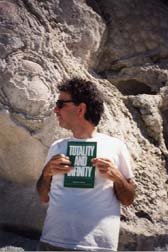Our Commonality


Before, I at times lived under the illusion that my life was without risk. Now, having no choice, for I constantly confront the fact that my time may soon run out, I exist only as a risky situation. I am risk. There is no beyond this state. There is no reliance on becoming, alone, what I am not now. Death approaches, and I write from this lack of retreat. I do so not just to tell others what it’s like, or to describe this unnerved state of mind and body, confronting what is unrepresentable – but to locate, paradoxically, an autonomous commonality free of justification for its existence. It is a commonality grounded on one’s reaching out toward another. This means working at an exchange that begins, as Derrida has it, with being conceptualized: that particularizes being, that works at an exchange in relation to ‘what’ and ‘whom.’ I write to encounter the person I love, to reach a friend, a stranger. I imagine her, I work to allow her access to her response. This entails a paradoxical questioning and ambiguous answering that begins with a generative tentativeness built upon paradoxes – for, as Heidegger writes, “being never is, never shows itself, is never present, is never now.” The task requires a rigor predicated on the very irreducibility of the other. The other: who pulls me, strips me of myself; who demands that I communicate our commonality; who says, that’s all there is and that is not all there is. “Encounter is separation.” For this oxymoron to become the actual precondition for an exchange, writing must be unbound from predeterminations, community censoring intentions, projects. Yet, such an exchange is always constrained. Although what I would communicate is constantly displaced, contextualized, and recontextualized by the bifurcating connotations that are the very essence of language, I am nevertheless immersed, that is, determined by the indeterminate possibility of words. Language parallels being’s absence and presence. Its play of signs enacts analogies to my ‘present’ situation. Writing and life: I write so that words may bring to existence being actual in its time between immediacies, between, between identifications. One exists in an interval both known and enigmatic. Again and again, the other brings risk into existence by compelling a vigilance keyed to this fragility of correspondences.
Jerry Estrin
May 6, 1947 – June 22, 1993
"Our Commonality" was first published in Avec 7 in 1994, an issue guest-edited by Norma Cole. I later published it in the on-line journal non. The photo of Jerry was taken by me at Pyramid Lake in Nevada. The photo of me was taken by Norma near Rainbow Lodge in the Sierra Nevada the day we scattered Jerry's ashes.


Before, I at times lived under the illusion that my life was without risk. Now, having no choice, for I constantly confront the fact that my time may soon run out, I exist only as a risky situation. I am risk. There is no beyond this state. There is no reliance on becoming, alone, what I am not now. Death approaches, and I write from this lack of retreat. I do so not just to tell others what it’s like, or to describe this unnerved state of mind and body, confronting what is unrepresentable – but to locate, paradoxically, an autonomous commonality free of justification for its existence. It is a commonality grounded on one’s reaching out toward another. This means working at an exchange that begins, as Derrida has it, with being conceptualized: that particularizes being, that works at an exchange in relation to ‘what’ and ‘whom.’ I write to encounter the person I love, to reach a friend, a stranger. I imagine her, I work to allow her access to her response. This entails a paradoxical questioning and ambiguous answering that begins with a generative tentativeness built upon paradoxes – for, as Heidegger writes, “being never is, never shows itself, is never present, is never now.” The task requires a rigor predicated on the very irreducibility of the other. The other: who pulls me, strips me of myself; who demands that I communicate our commonality; who says, that’s all there is and that is not all there is. “Encounter is separation.” For this oxymoron to become the actual precondition for an exchange, writing must be unbound from predeterminations, community censoring intentions, projects. Yet, such an exchange is always constrained. Although what I would communicate is constantly displaced, contextualized, and recontextualized by the bifurcating connotations that are the very essence of language, I am nevertheless immersed, that is, determined by the indeterminate possibility of words. Language parallels being’s absence and presence. Its play of signs enacts analogies to my ‘present’ situation. Writing and life: I write so that words may bring to existence being actual in its time between immediacies, between, between identifications. One exists in an interval both known and enigmatic. Again and again, the other brings risk into existence by compelling a vigilance keyed to this fragility of correspondences.
Jerry Estrin
May 6, 1947 – June 22, 1993
"Our Commonality" was first published in Avec 7 in 1994, an issue guest-edited by Norma Cole. I later published it in the on-line journal non. The photo of Jerry was taken by me at Pyramid Lake in Nevada. The photo of me was taken by Norma near Rainbow Lodge in the Sierra Nevada the day we scattered Jerry's ashes.

1 Comments:
I have been haunted by Jerry’s phrase “I am risk” ever since I first read “Our Commonality” many years ago.
As an example of the “fragility of correspondences” that Jerry mentions: the day of his passing coincides with the day after summer solstice. This is in fact the day that light begins its retreat – though Jerry shows us how, even as “death approaches, [to] write from the lack of retreat.”
This encounter from which there is no retreat nonetheless is a turning point (as the solstice is the day of light’s farthest retreat from night), a turning away and a turning into something other.
As Jerry puts it: “Language parallels being’s presence and absence.” A totality that can never be fully present to itself = infinity.
Post a Comment
<< Home